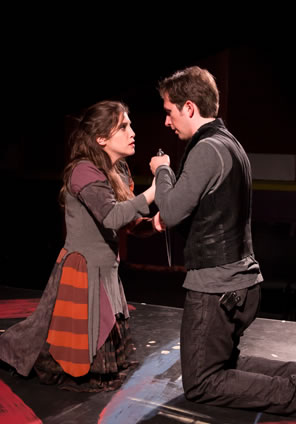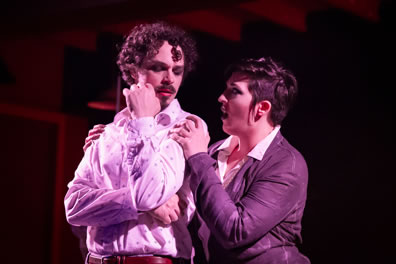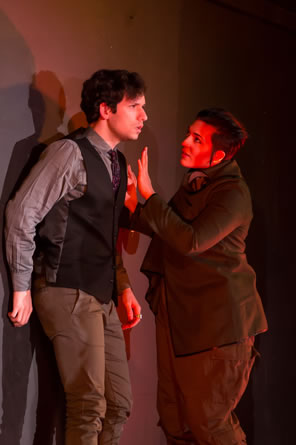A King and No King / 'Tis Pity She's a Whore
Incest Rep Flips Horror with Humor
By Francis Beaumont and John Fletcher/John Ford
Brave Spirits Theatre, The Lab at Convergence, Alexandria, Virginia
Friday and Saturday, March 31 and April 1, 2017, front row side of studio theater
Directed by Cassie Ash and Charlene V. Smith

Top, Annabella (Jenna Berk, left) and Giovanni (Danny Cackley) express their love and understanding of the consequences in John Ford's 'Tis Pity She's a Whore. Below, Arbaces (Brendan Edward Kennedy) anguishes over his love for his sister in Francis Beaumont's and John Fletcher's A King and No King. The two plays comprise Brave Spirits' Incest Rep at The Lab at Convergence. Photos by Claire Kimball, Brave Spirits Theatre.

The Incest Rep, as Brave Spirits is calling its repertory of the Francis Beaumont/John Fletcher collaboration A King and No King and John Ford's 'Tis Pity She's a Whore, is actually a pairing of 1 1/2 incestious relationships. Both Jacobean plays (A King and No King was first staged in 1611, 'Tis Pity came about 30 years later) dwell on the overly intimate behavior between brothers and sisters (or not), but they look at this taboo topic from two different angles. To use a cinematic basis of comparison, 'Tis Pity is akin to a James Wan horror flick while A King and No King is something Mitchell Hurwitz of Arrested Development fame might have come up with. The plays' authors also use different styles of composition, and the rep's two directors, Charlene V. Smith for 'Tis Pity and Cassie Ash for A King and No King, take appropriately different approaches to staging the two plays.
But with one cast. That proves to be the most important link between the two plays in this repertory. From the gut-wrenching horror of 'Tis Pity to the gut-busting humor of A King and No King, this company of fine actors can cause you to jerk back in shock in one play and have you doubled over in laughter in the next.
My personal favorite of the two is A King and No King, primarily because I've not seen it before and it adds to my increasing fondness for Beaumont and Fletcher. Its brand of ironic comedy is so modern, I don't understand why it's not staged more often. As for 'Tis Pity She's a Whore and Ford's sick taste for sociopathic behavior, this melodrama spews excessive vile, bile, and blood and features a slate of characters so despicable that the two incestuous lovers at the center can come off as heroically endearing. Still, it's a fun play.
Brave Spirits' staging is my third exposure to 'Tis Pity and the first I fully appreciated. Smith, the company's producing artistic director, embraces the hyperdramatic nature of Ford's script and gets the whole company to play the characters' emotions broadly while maintaining disciplined gestures and movement. In this staging, we see how Ford, working today, would be doing a reboot of Dallas or Dynasty for Starz utilizing all the in-your-face sex and blood he could muster.
Costume Designer Adalia Tonneyck uses modern dress for both plays, and for 'Tis Pity she incorporates stylish European fashions to create the play's gothic feel. Giovanni (the incestuous brother played by Danny Cackley) adds a black leather vest to his black jeans and gray sweatshirt. Annabella (his incestuous sister played by Jenna Berk) layers a gray and red sleeveless tunic over a black lace bodice and black print dress. Putana (Annabella's gossiping tutoress played by Kathryn Zoerb) wears a long empire dress with angled flounce in back and knee-high brown boots. Those boots were meant for more than just walking and looking hot; they also serve as a hiding place for Putana's flask of booze and Annabella's stitching hoop.
Ford peoples his play with more unsavory characters than Richard Nixon's White House. The nobleman Soranzo (Ian Blackwell Rogers), the wealthiest of Annabella's suitors, indulges in adultery with one Hippolita and even sends her husband, Richardetto, on a dangerous mission intended to get him killed, but then dumps Hippolita when he decides to stalk Annabella. At the end he also conspires to have Giovanni killed. In Rogers' intense portrayal of this self-aware elitist, we have no doubt of what Soranzo is capable of doing. "I carry hell about me: all my blood is fired in swift revenge," he says, with Rogers intoning Dante's seventh circle of hell in his delivery. This is only after Soranzo has discovered his new bride is already pregnant: he has yet to learn she is carrying his new brother-in-law's baby. His servant, Vasques (Briana Manente), might be the most loyal of servants in literature, but he engages in murder, torture, and his own slimy duplicity in his unconditional service to Soranzo. Menente plays him with treachery subtly oozing through her pores, the kind of performance that makes you shudder.
Not only is dumped mistress Hippolita (Rebecca Ellis) trying to murder Soranzo, so is her cuckolded husband, Richardetto (Gary DuBreuil), who is very much alive and returned disguised as a doctor wearing a white coat over a diamond-patterned sweater. But his conspiracy using the hot-headed Grimaldi (Erik Harrison)—also a suitor to Annabella—as his foil goes awry when Grimaldi accidently slices the innocent imbecile Bergetto (Brendan Edward Kennedy) with a poisoned sword in the dark thinking him to be Soranzo. Bergetto is yet another suitor to Annabella, forced into the pursuit by his wealth-pursuing aunt Donada (Lisa Hill-Corley) against not only his real desires but his foolish nature, too. Upon Bergetto's murder, his loyally like-minded servant Poggio (Alison Talvacchio), Donada, and Richardetto himself (whose niece had become betrothed to Bergetto) appeal to the Cardinal (Kennedy) for justice. However, the Cardinal brushes aside the law—both civil and religious—to protect his kinsman Grimaldi. The Cardinal also dubiously seizes on the estates of the two great families destroyed by the climactic massacre.
OK, one character doesn't have any noticeable blemishes, Friar Bonaventura, Giovanni's mentor (and played by Harrison who, in doubling as Grimaldi, requires quick costume and personality changes in back-to-back scenes). Though Bonaventura is not a bad guy, he's not a good mentor, either, for all his preaching, railing, advice, and prayer can't waylay his pupil from seducing his own sister.
"The beauty of this play is in Ford's ability to make us sympathize with the characters who are supposedly committing the worst sin," Smith writes in her program notes. "When surrounded by characters more corrupt than they, the lovers, though incestuous, become pure by comparison." Well, yes and no. Yes with Berk's Annabella, who displays a pure innocence. Besieged on all sides by egotistical, raging, and stupid suitors and a father (Darren Marquardt) trying to marry her off at the right price, she gives herself up totally to the one true love she knows, even if it is that of her brother. Still, she knows what she's getting into. The first kiss between Giovanni and Annabella is apprehensive, and as soon as lips touch they part quickly waiting for the lightning to strike. When it doesn't, they kiss again a little more confidently, but quickly part and look around to see if God might be sneaking up on them. No sign of God, they let go, pouring it on with their third kiss.
But, no, with Giovanni. In my opinion, he is 'Tis Pity's most thorough personification of evil. For all his naive idealism, with a perpetual hard-on five times that of Shakespeare's Romeo, Cackley's Giovanni is little better than a rapist and ultimately a sociopathic monster. Even his constant attempt to evoke pity from the priest, from us, and, most dangerously, from the gullible Annabella fits the MO. Giovanni's actions at the end make Hannibal Lecter seem a kitten, but his sinister nature first emerges early in the play when he scans the friar's scriptural lesson on virtue and, through lawyer's logic, equates the mind's beauty to the body's beauty and, ergo, virtue to love which is synonymous with lust, "since in like causes are effects alike." "O ignorance in knowledge!" replies the friar. Cackley's employing a sympathetic cloak over Giovanni's scary truth pays off at the play's climax when brother and sister seem to enter a suicide pact. I knew what was coming, but not the violently sudden manner in which Cackley stabs his sister lover and child all at once: I nearly suffered whiplash snapping my head back in horror, and across the way in the 38-seat studio theater with a thrust-stage configuration, another critic's gaping jaw hung below sea level all the way through Giovanni re-entering in the next scene with Annabella's still-hot heart in his hand (that's not an allegory).
So, should I wear a neck brace when returning the following night for A King and No King? Turns out I needed a heat wrap for the sore muscles in my belly after seeing this Beaumont and Fletcher masterpiece. The two playwrights individually and collaboratively wrote exquisitely poetical verse, but Brave Spirits Resident Dramaturg Ash's direction homes in on their script's comic lines to deliver zinger after zinger every bit as shocking as a knife thrust through the—well, guess. The jokes nevertheless are character-driven, which, to be as effective as they are, require resonantly character-driven performances from the actors. Thus, after the soap opera–worthy, fight-choreographed performances of 'Tis Pity, the same cast of actors becomes a sitcom-worthy ensemble displaying impeccable comic timing.


Above, playing the amoralzer of John Ford's 'Tis Pity She's a Whore, Briana Manente as Vasquez advises her master, Soranzo (Ian Blackwell Rogers). Right, playing the moralizer of Francis Beaumont's and John Fletcher's A King and No King, Manente as Mardonius counsels his king Arbaces (Brendan Edward Kennedy). The two plays comprise Brave Spirits' Incest Rep at The Lab at Convergence. Photos by Claire Kimball, Brave Spirits Theatre.
Exemplary in this is Manente, again playing the most loyal of servants in Mardonius—always speaking his mind to his king Arbaces—but this time with congenial intensity and a sharp wit. When Arbaces (Kennedy) freezes upon seeing his grown-up sister, Panthea (Zoerb) for the first time in several years, Mardonius prods him: "A tree would find a tongue to answer her," which Manente delivers with exasperated incredulity.
Arbaces, King of Iberia, is, as Mardonius describes him in the first scene, "vainglorious and humble, and angry and patient, and merry and dull, and joyful and sorrowful, in extremities in an hour." Should have said "in a minute," yea, in seconds in Kennedy's schizophrenically impassioned portrayal. Having just defeated Tigranes (DuBreuil), King of Armenia, in single combat and brought his rival king home for ransom and to marry his sister, Arbaces manages to insult and praise his captive in the same sentence. Tigranes, already in love with a commoner, Spaconia (Talvacchio), maneuvers to get her into the service of Panthea so that he can remain near his beloved. But when Spaconia meets Panthea, she knows Tigranes will be swept up in her beauty and personality, and sure enough the Armenian king is smitten at first sight of Panthea. Because Arbaces also is smitten at new sight of Panthea, Tigranes uses his rival king's fit of stupid silence to make his move on the princess, since, after all, he is supposed to marry her. This sends Arbaces into a tyrannous mode as he imprisons both Tigranes and his own sister. And his mother (Ellis), as well. Then he turns his attention to his new and most potent foe: his incestuous lust.
In the frenetic behavior of Kennedy's Arbaces, this is just more comic fodder, despite the moral quagmire it causes Arbaces and outright horror in Mardonius (in 'Tis Pity, Manente's character is the play's amoralizer; in A King and No King, she's the play's moralizer). We also get a scene that parallels that of 'Tis Pity when Arbaces finally and fitfully confesses his sexual love for Panthea. She actually reciprocates, which is not unexpected as, in Zoerb's playing, the sisterly love at the play's start seems more like pop star idolatry. Turns out, though, that Gobrius (Marquardt), the lord protector of Iberia in Arbaces' absence, pander-like had been surreptitiously feeding their mutual lust through letters and report, leading to the plot twist behind the play's title.
Ash in her program notes calls A King and No King "a play of paradoxes. Of course incest is terrible—the mere fantasy drives Arbaces out of his humanity and into escalating violence," she writes. "Unlike the rep's partner play, 'Tis Pity She's a Whore, however, the incestuous desire in A King and No King only tests the limits of the permissible. As we explore the impetus for the reprehensible, we move directly toward tragedy. Just before the worst paradoxes in the play transition from contradictions to troubling new truths, the playwrights gift us a reprieve, and we end in comedy."
Well, we begin in comedy, too, as the first character on the stage is Bessus, played by Rogers. In a 180-degree contrast to his Soranzo in 'Tis Pity, Bessus is a coward Iberian soldier who earned his promotion to captain when he mistakenly ran his company toward rather than away from the enemy. Rogers pulls off the character calisthenics of playing a man who is a coward, knows himself to be a coward, knows everybody else knows him to be a coward, but yet must pretend to be the hero; all the while Rogers finds an innate charm in a man who could in lesser hands be presented as mere buffoon. His highlight moment—literally, thanks to Lighting Designer Jason Aufdem-Brinke—comes when Panthea and the rest of the court long to hear Bessus describe the single combat of the two kings. Rogers' Bessus three times sets off on a dramatic account of the fight as the stage lights narrow on him; but each time, his tale devolves into a report about his actions and non-actions—not only how he ended up trading finger salutes with an Armenian captain but also how he didn't provide the signal for the kings to fight—and the lighting resumes a generic bathing of the stage as the rest of the annoyed company interrupt him.
As fascinatingly funny as Bessus is—Mardonius aptly says of him, "To hang him were to cast away a rope"—his subplot involving the formal measuring (with tape rule) of his cowardice peters out. Nevertheless, his and Arbaces' parallel of paradoxes intersect at the production's comical highpoint. After Mardonius refuses to serve the king as love messenger to Panthea and leaves in disgust, Arbaces employs Bessus for the task. Of course, Bessus accepts the assignment without hesitation; of course, Bessus doesn't comprehend exactly what message he's supposed to take to the king's sister, nor does he clue into Arbaces's self-flagellating disposition as he talks around his lustful purposes. "I'll do your business as well as they that look better," Bessus says, misunderstanding Arbaces's allegorical description of such a messenger as he would employ: "And when this is dispatched," Bessus continues, "if you have a mind to your mother, tell me, and you shall see I'll set it hard." "My mother!" a horrified Arbaces cries as Kennedy nearly swoons with self-revulsion while the audience doubles over in stitches.
Now there's a paradox. The two plays in Brave Spirits' Incest Rep each in their own way take a multiperspective look at the matter of sibling sex. Taken together, these plays showcase a talented company and sure-handed direction that delivers horror and humor so effectively, you might end up in urgent care.
Eric Minton
April 15, 2017
Comment: e-mail editorial@shakespeareances.com
Start a discussion in the Bardroom



 Find additional Shakespeareances
Find additional Shakespeareances